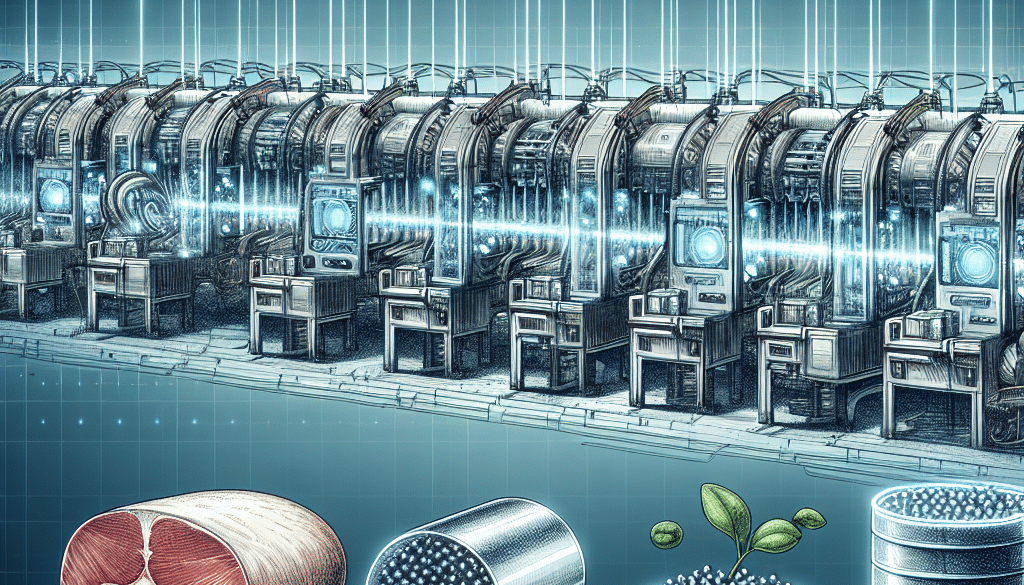Preservative Technologies for Long-Lasting Proteins: Freshness Extended
-
Table of Contents
- Extending Freshness: Innovative Preservative Technologies for Long-Lasting Proteins
- The Importance of Protein Preservation
- Traditional vs. Modern Preservation Methods
- Natural Preservatives and Hurdle Technology
- High-Pressure Processing (HPP)
- Modified Atmosphere Packaging (MAP)
- Edible Coatings and Films
- Case Studies and Statistics
- Conclusion: The Future of Protein Preservation
- Discover ETprotein’s High-Quality Protein Products
Extending Freshness: Innovative Preservative Technologies for Long-Lasting Proteins

Proteins are fundamental to our diet, providing the essential building blocks for muscle, skin, enzymes, and hormones. However, preserving the freshness and functionality of protein-rich foods and supplements is a significant challenge for the food industry. With consumers increasingly demanding minimally processed foods with clean labels, the industry is under pressure to find innovative solutions that extend the shelf life of proteins without compromising on safety or nutritional value. This article explores the cutting-edge preservative technologies that are helping to keep proteins fresh for longer.
The Importance of Protein Preservation
Proteins are highly susceptible to spoilage due to their complex structure and the presence of moisture, which can lead to microbial growth and enzymatic reactions. Spoilage not only affects the taste, texture, and appearance of protein products but can also result in the loss of nutritional quality and the formation of harmful substances. Effective preservation techniques are therefore essential to ensure the safety, quality, and longevity of protein-rich foods and supplements.
Traditional vs. Modern Preservation Methods
Traditional methods of protein preservation include drying, salting, smoking, and chemical preservatives. While these methods can be effective, they often alter the taste and nutritional profile of the protein and may not meet the clean label criteria that many consumers now demand. Modern preservation technologies aim to overcome these limitations by using natural or less invasive techniques that maintain the integrity of the protein.
Natural Preservatives and Hurdle Technology
Natural preservatives, such as plant extracts, essential oils, and bacteriocins, are gaining popularity as alternatives to synthetic chemicals. These substances can inhibit the growth of spoilage organisms without significantly affecting the sensory properties of the protein. Hurdle technology, which combines multiple preservation methods at lower intensities, is another approach that can effectively extend the shelf life of proteins while maintaining their quality.
High-Pressure Processing (HPP)
High-pressure processing (HPP) is a non-thermal preservation method that uses extremely high pressure to inactivate microorganisms and enzymes that cause spoilage. HPP can extend the shelf life of proteins without the use of heat, which helps to preserve their nutritional and sensory properties. This technology is particularly useful for ready-to-eat meats, seafood, and dairy products.
Modified Atmosphere Packaging (MAP)
Modified atmosphere packaging (MAP) involves altering the composition of the gas inside the packaging to slow down microbial growth and enzymatic reactions. By reducing the oxygen concentration and increasing the levels of carbon dioxide or nitrogen, MAP can significantly extend the shelf life of protein products without the need for chemical preservatives.
Edible Coatings and Films
Edible coatings and films made from proteins, polysaccharides, or lipids can provide a barrier to oxygen, moisture, and microbial contamination. These coatings can be enriched with natural preservatives, antioxidants, and other functional ingredients to enhance the protective effect and potentially add nutritional value to the protein product.
Case Studies and Statistics
Several case studies demonstrate the effectiveness of these preservation technologies. For example, a study on HPP-treated sliced ham showed a shelf life extension of up to 60 days, while maintaining its sensory qualities. Similarly, MAP has been shown to double the shelf life of fresh chicken breasts. Statistics indicate that the global market for food preservation technologies is growing, with a projected increase driven by consumer demand for fresh and safe protein products.
Conclusion: The Future of Protein Preservation
The future of protein preservation lies in the development of innovative technologies that can deliver safe, nutritious, and long-lasting protein products to meet the evolving demands of consumers. By leveraging natural preservatives, HPP, MAP, and edible coatings, the food industry can provide fresher, cleaner-label protein options that support a healthy diet and busy lifestyle.
Discover ETprotein’s High-Quality Protein Products
If you’re looking for premium protein products that benefit from the latest preservation technologies, ETprotein is your go-to source. Their extensive range of organic and plant-based proteins, including rice, pea, pumpkin seed, and sunflower seed proteins, are produced with the highest standards of quality and safety in mind. ETprotein’s commitment to non-GMO, allergen-free ingredients ensures that you receive the best protein products for your nutritional needs.
About ETprotein:
ETprotein, a reputable protein Chinese factory manufacturer and supplier, is renowned for producing, stocking, exporting, and delivering the highest quality organic bulk vegan protein and plant proteins. They include Organic rice protein, clear rice protein, pea protein, clear pea protein, pumpkin seed protein, sunflower seed protein, mung bean protein, peanut protein etc. Their offerings, characterized by a neutral taste, non-GMO, allergen-free attributes, cater to a diverse range of industries. They serve nutraceutical, pharmaceutical, cosmeceutical, veterinary, as well as food and beverage finished product distributors, traders, and manufacturers across Europe, USA, Canada, Australia, Thailand, Japan, Korea, Brazil, and Chile, among others.
ETprotein specialization includes exporting and delivering tailor-made protein powder and finished nutritional supplements. Their extensive product range covers sectors like Food and Beverage, Sports Nutrition, Weight Management, Dietary Supplements, Health and Wellness Products, and Infant Formula, ensuring comprehensive solutions to meet all your protein needs.
As a trusted company by leading global food and beverage brands and Fortune 500 companies, ETprotein reinforces China’s reputation in the global arena. For more information or to sample their products, please contact them and email sales(at)ETprotein.com today.












